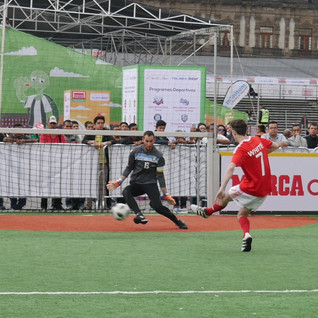"They're not homeless people playing football, they're footballers who happen to be homeless"
- Nov 15, 2018
- 4 min read
Updated: Nov 19, 2018

We like to imagine we know who a homeless person is - rough looking, sat on the floor, being either completely passive or a complete nuisance, sometimes drunk, sometimes shouting and generally - they smell. Perfect reasoning in our head to avoid such folk, it’s for our own safety, right? My experiences over the past year have shown this stereotype to be wholly untrue.
The Homeless World Cup has cemented my previous experiences. There is no such thing as a homeless person, a volunteer of 8 years says to me. "You see these teams, they’re not homeless people playing football, they’re footballers who happen to be homeless.”

I know what you’re thinking PC overload, give us a break! Take a second however, analyse the language and now imagine someone labelling you in the same way. People, person, human should always come before homeless. Why? It feeds a message that those who are homeless - ‘homeless people’ as they’re often called, are a sub-category of society and we certainly seem to treat them like it.
You see it may not seem important to switch that phrase around but language is important; don’t let anyone tell you any different. A mundane example but greeting someone in the morning with “Hi, how are you? Did you have a good night last night?” In comparison to “I’m so tired, I wish it was Friday already” has a completely different effect on those in your vicinity. Obviously - I hear you scream. So why do we dismiss the importance of greeting those who are homeless on our streets? Convincing ourselves that a “hello, good morning!” is not appropriate for another human being, that it might be patronising and inappropriate.
My message has always been do what you think is acceptable, give money if you want to, don’t if you don’t want to. Give food, give clothing, sleeping bags - do what you can and see as helpful. Not everyone can do this however, not everyone is in a position to spend their salary on items for people when they’re struggling themselves. Everyone, no matter what wealth they have, where they come from, even what language they speak, can acknowledge. It has power beyond your expectation. You will likely never know the effects of your words or the extent to which they inspire someone to carry on living but it is crucial you say them, you look their way, you acknowledge.

This tournament, The Homeless Football World Cup is indescribable for all the right reasons. It has shown me the power of acknowledgment on a more serious, life-changing level. Giving purpose where players never had any, a sense of belonging, a sense that someone else depends on them and therefore they have to turn up, they have to give it their all. That is real power. That is what changes lives; not money but purpose, not a roof over their head but a family, a place they belong.
In all honesty, the tournament is incomprehensible before experiencing it. You must organise 47 countries, ensuring they each hold trials for players who have experienced homelessness in the past 12 months or are still currently homeless. Give them training, skills development and a 12 week programme to follow before flying them over to another country when a large proportion have never even been on a plane before. The sceptic inside of me questioned the professionalism in which the tournament would run, the quality of football that would be played and whether anyone would even come and watch.
My doubts; extinguished within 3 minutes. Teams parading around the Zocalo (the main square) proudly singing their anthems, chanting, waving flags, dancing, shouting and embracing every second of being centre stage as they take part in the opening ceremony. The Mexican commuter and tourist alike stopping to take pictures, waving and in the process being educated on homelessness. THIS is what a ‘homeless person’ looks like - funnily enough, just a person and in this sense, an international athlete.

Fireworks, dancing and a traditional welcome by the Mexicans kicked off a fantastic day of football and celebration. Each team playing 2 group games of 7 minute halves. The game here is fast, 4-a-side with rolling substitutes. A type of street football played all over the World in hostels that house those who are homeless, commonly found across social media networks, such as Street Soccer Scotland or Street Football Wales (for example).
No more than an hour watching games was needed to show the true power of sport - the unity between teammates and even opposing teams. Each player knowing that the other has overcome their own demons to be here and potentially still has them not far from what seems a cool and collected surface exterior. When those past experiences do surface however, there is an air of support, no one is alone anymore - even opposing teams have the back of their opponents. There really is only one team at the Homeless Football World Cup and it consists of 500 players and 47 nations.
This is about More Than Football.



















Comments